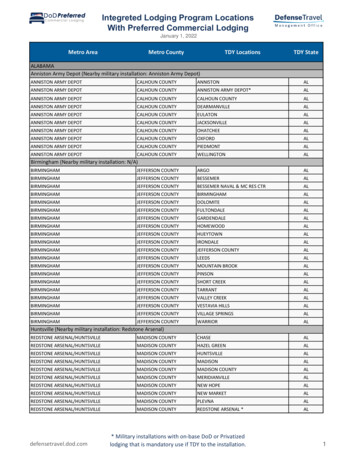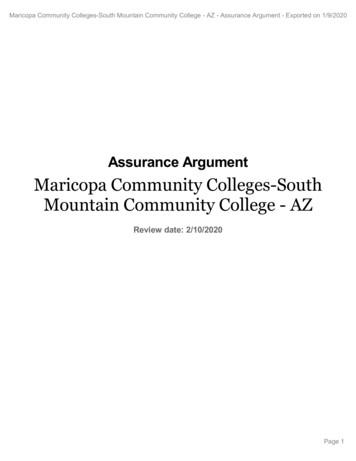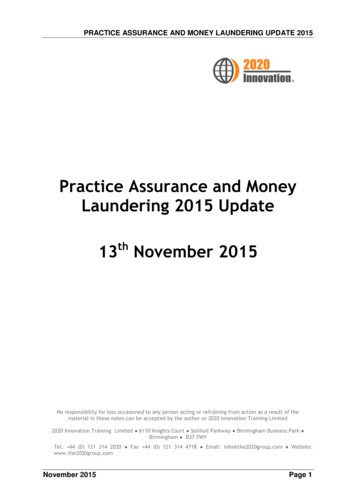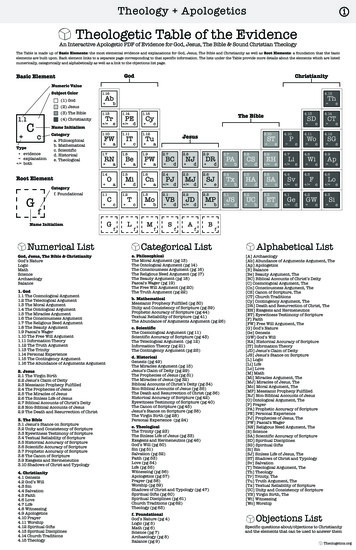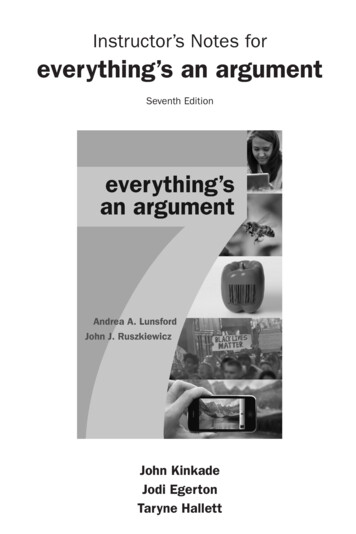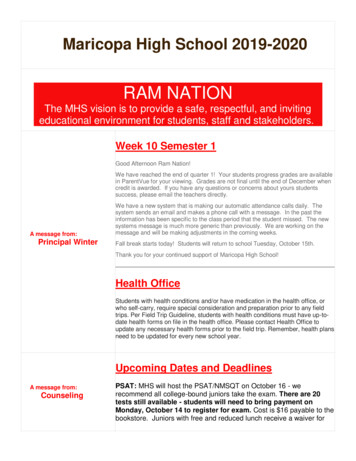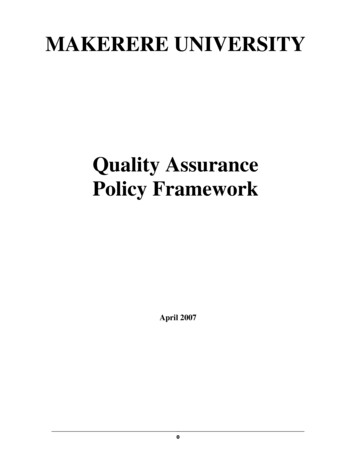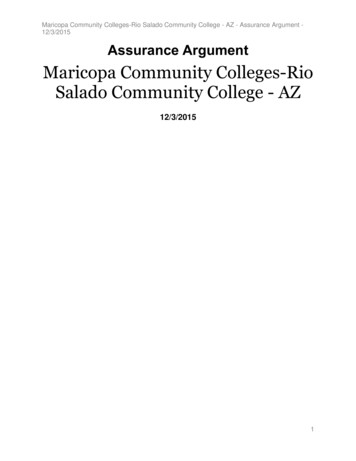
Transcription
Maricopa Community Colleges-Rio Salado Community College - AZ - Assurance Argument 12/3/2015Assurance ArgumentMaricopa Community Colleges-RioSalado Community College - AZ12/3/20151
Maricopa Community Colleges-Rio Salado Community College - AZ - Assurance Argument 12/3/2015IntroductionRio Salado College, headquartered in Tempe, Arizona, was established in 1978 by the MaricopaCounty Community College District (MCCCD) to serve nontraditional students at adistance. Thirty-seven years later, Rio Salado is the largest of the 10 colleges that comprise theMCCCD both in terms of headcount and full-time student equivalent (FTSE), serving a totalstudent population of 56,472 in FY2014-15, including close to 30,000 online.Rio Salado is dedicated to providing innovative educational opportunities to meet the needs oftoday’s students, offering affordable access to higher education through a variety of avenues thatinclude online learning, college bridge pathways, community-based learning, corporate andgovernment partnerships, early college initiatives, and university transfer. The Collegeapproaches these purposes through a focus on active engagement in local communities,customized courses and programs offered both online and in location-based settings, theemployment of data analytics to ensure institutional accountability, and a comprehensive slate ofstudent support services. These are offered in multiple modalities to provide personalized serviceand a commitment to student success to a widely dispersed and diverse student body.Rio Salado has been committed to the principles of Total Quality Management (TQM) andContinuous Quality Improvement (CQI) for close to 25 years. The visiting team for RioSalado’s 2012 comprehensive visit commended the College for its support of the community,national leadership role in online learning, and commitment to continuous quality improvementin an extremely supported environment. While remaining true to its nontraditional roots, RioSalado has matured into a successful model for high-quality, low cost, accessible highereducation.2
Maricopa Community Colleges-Rio Salado Community College - AZ - Assurance Argument 12/3/20151 - MissionThe institution’s mission is clear and articulated publicly; it guides the institution’s operations.1.A - Core Component 1.AThe institution’s mission is broadly understood within the institution and guides its operations.1. The mission statement is developed through a process suited to the nature and culture ofthe institution and is adopted by the governing board.2. The institution’s academic programs, student support services, and enrollment profile areconsistent with its stated mission.3. The institution’s planning and budgeting priorities align with and support the mission.(This sub-component may be addressed by reference to the response to Criterion 5.C.1.)Argument1.Rio Salado College is one of 10 institutions in the Maricopa County Community College District(MCCCD), one of the largest districts in the nation. A seven-member Governing Board overseesall 10 colleges. Each MCCCD college has a unique mission, while conforming to the broaderframework of the District’s mission documents. Rio Salado’s vision, mission, and values alignwith those of the District, but reflect the College’s innovative culture and unique role within theDistrict.Rio Salado’s culture has long been rooted in the principles and practices of Total QualityManagement, which will be explained in detail in Criterion 5.C.2.During the process of updating and refining the College’s strategic plan during FY2012-13, theRio Leadership Council (a representative body comprising all departments and divisions) cameto realize that the vision and mission statements no longer fully aligned with the CollegeStrategic Plan Goals, which focus on the needs of the College’s students, their learningexperiences, and student success and completion initiatives. A revision of the mission documents(collectively comprising the vision, mission, and values) was then conducted through acollaborative process of cross-departmental subgroups of the Leadership Council, who in turnsolicited review feedback from their constituent groups.The new vision (“We reinvent the learning experience to change lives”) highlights a focus ontransformative learning, as exemplified by the College’s concentration on degree and certificatecompletion, workforce development with community partners, university transfer, and GEDattainment. Rio Salado’s mission documents were approved by the MCCCD Governing Board3
Maricopa Community Colleges-Rio Salado Community College - AZ - Assurance Argument 12/3/2015on May 21, 2013, and determined not to require Substantive Change consideration by the HigherLearning Commission on April 8, 2014.2.Rio Salado is a public community college, and in keeping with its role as a public institution,provides affordable access to academic programs across a wide spectrum. The missiondocuments state: Rio Salado offers affordable access to higher education through college bridgepathways, community-based learning, corporate and government partnerships, early collegeinitiatives, online learning, and university transfer. Each of these programs will be described indetail in the appropriate context.The College provides a comprehensive slate of student support services that align with itsmission commitment to “personalized service and a commitment to student success.” Because ofthe multiple instructional modalities offered, support services also are offered in multiplemodalities (online via chat or email, in person, via telephone, etc.) and in the locationsthroughout the Greater Phoenix metropolitan area where courses and programs areoffered. These support services will be described in detail in Criterion 3.D.Rio Salado’s enrollment profile is also consistent with its stated mission. Founded in 1978 as anontraditional “college without walls,” Rio Salado has evolved into the largest of the MaricopaCommunity Colleges in terms of both Full Time Student Equivalent (FTSE) and Headcount.3.Rio Salado’s strategic planning and budgeting processes are driven by the Collegevision, mission, and core values. Planning and budgeting will be addressed comprehensively inCriterion 5.C.1.Sources GB Summary RSC Mission Approval 1.A.1HLC-Vision Mission Approval 4.8.14 1.A.1MCCCD Vision and Mission 1.A.1Rio Culture Page 1.A.1Rio Fact Sheet 2014-15 1.A.2Rio Fact Sheet 2014-15 1.A.2 (page number 2)Rio Services 1.A.2Rio Strategic Plan 1.A.1Rio VisionMissionValues 1.A.34
Maricopa Community Colleges-Rio Salado Community College - AZ - Assurance Argument 12/3/20151.B - Core Component 1.BThe mission is articulated publicly.1. The institution clearly articulates its mission through one or more public documents, suchas statements of purpose, vision, values, goals, plans, or institutional priorities.2. The mission document or documents are current and explain the extent of the institution’semphasis on the various aspects of its mission, such as instruction, scholarship, research,application of research, creative works, clinical service, public service, economicdevelopment, and religious or cultural purpose.3. The mission document or documents identify the nature, scope, and intended constituentsof the higher education programs and services the institution provides.Argument1.Rio Salado’s mission documents are displayed on a “Culture page” which is posted on theCollege website, and in public spaces throughout the College buildings across all locations.Additionally, Culture Page handouts are distributed to all employees and to community membersas part of presentations to special groups.The Institutional Advancement Department is charged with communicating the College’smission and vision to diverse internal and external audiences. When the new mission documentswere adopted in 2014, activities included college-wide meetings for employees on the change offocus in the mission and vision, and alignment with the strategic plan. The revisions were alsointegrated into the new employee orientation process, and adjunct faculty orientation andcontinuing education materials.Rio Salado’s employees have consistently indicated knowledge of and engagement with theCollege mission. In the most recently available Employee Engagement Survey data (N 290;spring, 2014), the statements “I am aware of Rio Salado College’s Mission Statement” and “Iunderstand how my job supports Rio’s mission” each showed a mean score of 4.37 out of 5 and a90% agreement rate. Trend data demonstrate that these two statements have consistently beentop performers in this survey over the years.Over 92% of the adjunct faculty who responded to a 2015 Adjunct Faculty Survey (N 258)agreed with the statements “Rio Salado College’s new mission is relevant to my role as anadjunct faculty member” and “I understand how my faculty role supports Rio Salado’s mission,”with mean scores of 4.42 and 4.45 out of 5, respectively. Additionally, adjunct faculty indicatedknowledge of institutional priorities, as demonstrated by 90% agreement with the item “Iunderstand the major initiatives and goals of Rio Salado College” (mean 4.32).5
Maricopa Community Colleges-Rio Salado Community College - AZ - Assurance Argument 12/3/20152.Rio Salado’s leadership reviews the mission documents every two to three years to ensure thatthey still reflect current priorities and planning.The prior mission statement read:Rio Salado College transforms the learning experience through: Choice, access, and flexibilityCustomized, high quality learning designPersonalized service and organizational responsivenessIn 2014, this was augmented to the current statement:We transform learning through: Active community engagement and organizational responsivenessCustomized, high-quality courses and programsData analytics and institutional accountabilityFlexibility, affordability and innovationPersonalized service and a commitment to student successThus, the language of the College mission was enhanced in FY2013-14 to reflect the focus oncommunity engagement, a culture of assessment and data-driven decision-making, and an overtcommitment to student success, all of which had in fact long been hallmarks of College practice.3.Rio Salado’s mission documents speak to affordable access to higher education through collegebridge pathways, community-based learning, corporate and government partnerships, earlycollege initiatives, online learning, and university transfer. Within this context, the College’stransformative approach to learning is realized through the following five areas of focus: Active community engagement and organizational responsivenessRio Salado is actively engaged with its community throughout the greater Phoenix area(commonly referred to as “the Valley,”), providing classes and services in multiple locations.These locations provide programs and services appropriate to populations in local communities,including College Bridge Pathways, veterans, active military personnel, lifelong learners, earlycollege students, corporate-, government-, and military partners, and incarcerated students, inaddition to serving traditional college-age students. Because of Rio’s “systems approach” toproblem solving and its flexible structure, which have long been part of its culture, the College ispoised to respond quickly to needs and to adapt to changing realities for learners. Examples of6
Maricopa Community Colleges-Rio Salado Community College - AZ - Assurance Argument 12/3/2015this approach include the establishment of two “Communiversities” over the past few years,which were built in response to climate studies that resulted in partnerships with the localcommunities. Another example is the development of a comprehensive grant application andmonitoring infrastructure as a response to changing budgetary realities in Arizona (See Criterion5.C.1). Customized, high-quality courses and programsCustomization has been a hallmark of Rio Salado’s educational programs since its inception,with courses and programs targeted to the specific student populations referenced above inaddition to general education. The high quality of all College curriculum is driven by a processwhereby materials are reviewed regularly by the faculty chairs, the College CurriculumCommittee, advisory committees, and business and industry partners. New curriculum is vettedthrough a rigorous internal College process before being submitted to the District, wherecurriculum is developed via a common MCCCD course bank and district-wide approval process.Prior to the development of a new program, the College researches industry needs and programviability, and seeks input from community leaders and business partners. The curriculum processwill be described in detail in Criterion 3.C.1.The College’s extensive online course offerings (almost 900 distinct courses) are offered viaRioLearn, Rio Salado’s customized, proprietary Course Management System. Developed inhouse in partnership with Microsoft, RioLearn accommodates the College’s unique centralizedonline course development model (allowing for rigorous quality control) and multiple coursestart dates (40 Mondays per year). This course infrastructure and model will be detailed inCriterion 3.D.4. Data analytics and institutional accountabilityThe use of data analytics tools allows Rio Salado to spot trends, diagnose issues, and createsolutions and innovations in a shorter time than is generally the norm in highereducation. Examples of this approach include: PACE (Progress and Course Engagement) employs a predictive-analytics model built onhistorical student data to help students identify whether they are on track for successfulcourse completion. This model, which relies exclusively on student behaviors and alertsfaculty when students may need interventions, is being used in 23 of Rio’s highestenrolling courses, affecting over 16,000 students annually, and is currently predictingstudent success with 81% accuracy.Rio Salado is a founding member of the Predictive Analytics Reporting Framework(PAR), a non-profit provider of analytics designed to help institutions identify practicesthat contribute to student success.The College is partnering with Civitas, which uses data analysis to help identify studentneeds and match them with available resources, thereby enabling customizedinterventions for students who are at risk of dropping out.The annual assessment report, containing student learning outcomes performance data, isposted on the public-facing Assessment of Student Learning website.7
Maricopa Community Colleges-Rio Salado Community College - AZ - Assurance Argument 12/3/2015 Rio Salado’s Department of Institutional Integrity regularly reviews data on studentsresiding out of state to ensure compliance with State Authorization requirements.Department heads, including faculty chairs, follow trends through tools such as datacubes and BOExi (Business Objects Enterprise xi) retention reports, to assist withplanning and interventions as needed. For example, a BOExi real-time dashboard tracksthe number of students enrolled and retained per semester, with the ability to drill-downto prefix, course, section, and instructor level. Colored icons indicate whether the valuemeets the established benchmark for student retention (85%) at each level. Chairs usethese data to make decisions in areas such as curricular modification, outreach,and faculty staffing.In FY2013-14, College departments conducted in-depth, data-driven analyses todetermine the efficacy and sustainability of all academic programs and student serviceareas as part of the MCCCD-wide Maricopa Priorities initiative (see Core Component2.B).Flexibility, affordability, and innovationThese hallmarks of Rio Salado’s course offerings manifest through an innovative instructionalmodel that allows students the flexibility to begin online courses on any one of 40 Monday“starts” per year (see Criterion 3.A.3). Also, as part of the MCCCD, Rio Salado is committed tomaking educational opportunities affordable, and leads all 10 District colleges in its lowoperations costs, while generating 25% of the District’s revenues. Rio Salado also spends agreater proportion of resources on instruction and academic support (65.6% vs. 54%) than itssister colleges. Finally, because the College is committed to seeking “blue oceans” for thedelivery of services to students (as represented by Goal 4 in the College Strategic Plan: BlueOcean and Innovation), Rio Salado is deeply committed to finding new ways of bringinglearning to its key constituencies. Current College Action Plans (CAPs) under this goal includecommunity and partner engagement strategies, and researching and initiating new avenues ofgrowth for the College. This will be explained further under Strategic Planning in CoreComponent 5.C. Personalized service and a commitment to student successComprehensive student support services that target student populations across the board,including those with specific needs and goals, are provided as appropriate in the multipleinstructional modalities that the College offers; online and via chat service, in addition to thetraditional in-person and telephone.Employee behaviors in meeting mission service areas are measured via service standards whichhave been implemented systemically across departments in order to outline the level of customerservice to which departments are committed.Sources BOExi Report Example 1.B.38
Maricopa Community Colleges-Rio Salado Community College - AZ - Assurance Argument 12/3/2015 Civitas 1.B.3Culture Handout 1.B.1MCCCD Maricopa Priorities 1.B.3PAR Framework 1.B.3Rio Wave Catch the Culture 1.B.1.Rio Assessment of Student Learning 1.B.3Rio AssessmentReport 2013-14 1.B.3Rio College-wide meeting 1.B.1Rio Institutional Advancement 1.B.1.Rio Service Standards SharePoint 1.B.3Rio Services 1.B.3RioPace June 2011 1.B.39
Maricopa Community Colleges-Rio Salado Community College - AZ - Assurance Argument 12/3/20151.C - Core Component 1.CThe institution understands the relationship between its mission and the diversity of society.1. The institution addresses its role in a multicultural society.2. The institution’s processes and activities reflect attention to human diversity asappropriate within its mission and for the constituencies it serves.Argument1.The Maricopa Community Colleges have long demonstrated a strong commitment to diversity.Inclusiveness is a governing value of the District and diversity an area of emphasis in the Districtmission, while the Governing Board undertakes to ”govern with appreciation of the diversity ofour internal and external communities. Diversity is defined as the environment created withinMaricopa that demonstrates equity and mutual respect of each person.” AdministrativeRegulation 5 addresses non-discrimination in the learning and work environment at MCCCD inconsiderable detail. The District’s Diversity Calendar of Events for FY2015-16 demonstrates thewide scope of efforts across the MCCCD.Rio Salado College includes both diversity and inclusiveness in the list of core values that formpart of the College mission documents.Maintaining a Diverse WorkforceThe College makes consistent efforts to hire and maintain a diverse workforce, in keeping withthe MCCCD’s Affirmative Action Program for Minorities and Women, the Affirmative ActionProgram for Individuals with Disabilities, and the Affirmative Action Program for Veterans. Forhigh-level administrative positions, or those requiring very specific qualifications and expertise(such as residential faculty), national advertising is done via websites, newspapers, and journalstargeted to the discipline. Additionally, venues are used that allow for the widest possiblediversity in the applicant pool. For example, advertisements are placed in publications such asthe Chronicle of Higher Education, Native American Times, Journal for Blacks in HigherEducation, Latinos in Higher Education, American Association of Community Colleges,National Association of Asian American Professionals, Diverse Jobs, and Higher Ed Jobs.The demographics of Rio’s employees and students show close alignment of both ethnicity andgender.Diversity/Inclusiveness Employee TrainingOnce hired, all Rio Salado employees undergo a new employee orientation process, followedwithin their first year of employment by a rigorous orientation and training in the Rio culture10
Maricopa Community Colleges-Rio Salado Community College - AZ - Assurance Argument 12/3/2015and work environment, The Rio Way. A foundational day introduces participants to theCollege’s core values. Six half-day in-depth workshops then explore each of the valuesindependently, with the tenets of workforce diversity and inclusion presented in an interactiveand engaging format. Over the past three years, the Rio Way has provided in-depth orientationand training to 243 employees. Employees report that they find the training extremelyvaluable. Further information will be provided in Criterion 5.A.4.MOSAIC (Maximizing Our Strengths as An Inclusive Community), developed by the DistrictEmployee and Organizational Learning Team (EOLT), is required for all supervisory employeesin the MCCCD and is open to all interested employees. The 24-hour series is designed toenhance understanding of the principles of diversity, inclusion and engagement as lifelonglearning skills. Over the past three fiscal years, approximately 30 Rio employees have completedthe training each year.In addition, MCCCD offers mentorship programs that match interested employees withexperienced and diverse models and mentors from colleges across the District. Rio Salado hasapproximately five mentee participants per year.College Participation in Events for Diverse CommunitiesRio Salado participates in numerous community events targeted towards specific populations, asexplained below in Criterion 1.D.1.Diversity Advisory Council AwardThe MCCCD Diversity Advisory Council Award is presented annually to an employee orprogram at each MCCCD college that exemplifies a commitment to diversity and inclusivenessthrough support of Student Success Initiatives, One Maricopa, and/or Public Stewardship.Rio Salado College DAC Award recipients from the past three years are: 2015—Advisement and Support Teams of the Adults Achieving a College Education(AACE) program, which serves at-risk, first-generation college students.2014—Incarcerated Re-entry Division of Community Development, which utilizes a onestop philosophy to provide incarcerated individuals with the services and resourcesneeded for them to be successful.2013—East Valley Veterans Education Center (EVVEC), a “one-stop resource shop” forArizona veterans and their families, providing assistance with applying for VAeducational benefits, tutoring and academic skill building, and referrals to communityresources.Another example of alignment with Rio Salado’s core values is the Diversity/InclusivenessAward, one of several categories available through the Rewards & Recognition (R&R) program,which will be further explained in Criterion 5.A.4. Inclusiveness within the R&R program isdefined as “valuing internal and external customers as whole persons while respecting bothdifferences and commonalities.”11
Maricopa Community Colleges-Rio Salado Community College - AZ - Assurance Argument 12/3/2015The MCCCD supports a number of employee constituency groups. Representatives of theseconstituencies serve on the district-wide Diversity Advisory Council and are consulted by theChancellor in conjunction with the Chancellor’s Community Advisory Committees ascommunity or institutional issues require.2.Rio Salado College Diversity Processes and ActivitiesThe vision of the Maricopa Community Colleges is to work “collectively and responsibly tomeet the life-long learning needs of our diverse students and communities.” As indicated above,Rio Salado has incorporated both diversity and inclusiveness as core values, and serves widelydiverse constituencies through a number of different processes and at various College locationsin keeping with these values: “Start at Rio” Customized ProcessRio Salado has developed a guided, online process for entering students, featuring steps tailoredto their educational goals. Students enter through one of two portals (program-seeking or takingclasses) and then choose from detailed program-specific pathways, including Veterans, ActiveMilitary, Dual Enrollment, High School Equivalency, English Language Acquisition for Adults,Teacher Education, and online. College Bridge PathwaysRio Salado College is the largest provider of Adult Basic Education in the state of Arizona.Through state and federal grants administered by the Arizona Department of Education, CollegeBridge Pathways (CBP) programs are offered at College Locations throughout the greaterPhoenix area. CBP programs serve many first-generation and underprepared college students byteaching foundational coursework to prepare them for college classes. Between fall, 2012 andspring, 2015, almost 9,500 students were served in the High School Equivalency (HSE, formerlyGED) preparation programs.Rio Salado also offers students enrolled in College Bridge Programs the opportunity to completetheir High School Equivalency through a scholarship-based college and career preparationprogram named AACE (Adults Achieving a College Education), geared towards adults aged 16or older who are ready to commit to completing a degree, certificate, or workforce trainingprogram, and offered in both face-to-face and hybrid modalities. AACE was named a BrightSpot in Hispanic Education by the White House in fall, 2015.English Language Acquisition for Adults (ELAA), face-to-face classes for legal residents aged16 years or older, enrolled close to 7,000 students between fall, 2012 and spring, 2015.12
Maricopa Community Colleges-Rio Salado Community College - AZ - Assurance Argument 12/3/2015STAR-PATH (Successful, Talented Adults @ Rio-Practice, Analytics, Technology, and Help) isa five-tiered college and career student support model, designed to support the needs of thestudents entering and exiting the program as a bridge to post-secondary education and/or trainingto obtain employer identified skills.College Bridge Pathways students are eligible for membership in the National Adult EducationHonor Society (NAEHS). Rio Salado holds an annual induction ceremony to recognizeoutstanding CBP students. Co-Curricular OpportunitiesRio Salado College participates in district-wide co-curricular initiatives designed to supportdiverse student populations. ACE Puente (Youth ACE) assists at-risk high school students to geta head start on college by taking online or hybrid classes in their junior and senior years, in amentored, cohort-structured environment. Rio Salado has a fledgling chapter of the MaleEmpowerment Network (M.E.N.), an MCCCD program designed to improve enrollment,retention, and degree completion or transfer rates of male students from various backgrounds.Co-curricular programs are further described in Criterion 3.E.1. Disability Services and AccessibilityRio Salado’s Office of Disability Resources & Services provides information, resources, andservices which promote a successful, customized learning experience for students withdocumented disabilities, in keeping with MCCCD Administrative Regulation 2.8 (see alsoCriterion 3.D.1). The College’s Web Accessibility Team is comprised of faculty and personnelfrom IT, instructional design, course production, and disability services, and works on addressingaccessibility issues in the online environment and to ensure compliance with applicable laws andstandards, as stipulated in MCCCD Administrative Regulation 2.8.3. Largely as a result of thework of this team, Rio’s Course Production Department spent 967 employee hours creatingUniversal Design/ADA compliant improvements and modifications to courses in FY2014-15(see Criterion 3.D.4). RISERISE Learning for Life, geared towards senior citizens, is hosted by Rio Salado and housed atthe College’s Lifelong Learning Center, constituting the largest student association in theMCCCD. RISE provides non-credit community classes to retirement-age adults, taught byvolunteer content experts, and covering numerous topics requested by members. Theorganization has its own constitution and governance structure, and curriculum is determined bya RISE-appointed curriculum committee with input from members. In FY2014-15, RISEprovided 389 classes to 1,151 organization members, with an average attendance of 26participants per class. International Education13
Maricopa Community Colleges-Rio Salado Community College - AZ - Assurance Argument 12/3/2015The International Education Center is housed within Admissions, Registration & Records, andprovides international students with online learning opportunities for immersion in aneducational system different from their own. The Center staff provides a number of personalizedservices, such as individual help in selecting and registering for classes, academic advisement,information about course materials, assistance with completing the online tutorial, and guidanceregarding required documents to comply with Immigration rules and regulations and residencyrequirements. International Education serves over 1,000 walk-in students per year, and respondsto over 10,000 email inquiries and 2,000 telephone inquiries annually. Data on F1 Visa studentsfrom 58 different countries for the past three calendar years are as follows: 2012: 442 students completed 1,720 credit hours2013: 496 students completed 1,921 credit hours2014: 724 students completed 3,142 credit hoursRio Salado celebrates International Week each year, designed to celebrate the diversity ofdifferent cultures and provide an opportunity for international and ELAA students
Thirty-seven years later, Rio Salado is the largest of the 10 colleges that comprise the MCCCD both in terms of headcount and full-time student equivalent (FTSE), serving a total student population of 56,472 in FY2014-15, including close to 30,000 online. Rio Salado is dedicated to providing innovative educational opportunities to meet the needs of
